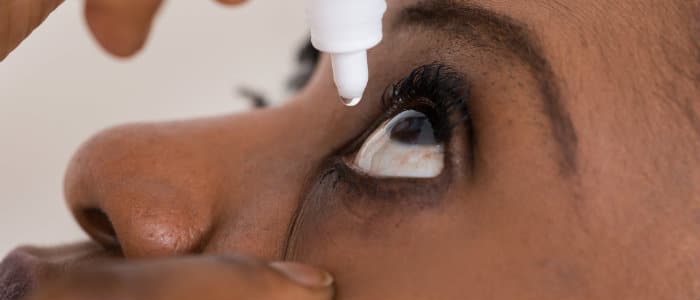If you constantly reach for your eye drops, it may be time to start looking into the bigger problem: Why do you need them so often? They’re a quick and gratifying fix to itchy or irritated eyes, but they don’t address what might be irritating.
Signs You’re Overusing Eye Drops
The American College of Allergy, Asthma, and Immunology recommends not using eye drops regularly beyond a couple of weeks unless instructed by your eye doctor.
Dr. David McGarey of Barnet Dulaney Perkins Flagstaff stated that usage depends on the type of eye drop, but regular use of eye drops is a concern. “Unless you’ve been directed to use over-the-counter eye drops by your doctor, you shouldn’t use them daily. They aren’t meant for long-term eye care, but they can certainly provide relief while you’re searching for the reason for your condition,” he explains.
Three signs you’re overusing eye drops:
- You’re consistently exceeding the daily use recommendations
- You view eye drops as the cure rather than a temporary treatment
- You’ve got an auto Amazon subscription set up
A Primer on Over-the-Counter Eye Drops
Not all OTC eye drops are the same. What type of drops do you use?
| Types of Eye Drops | Description |
|---|---|
| Artificial Tears | Artificial tears are used to maintain moisture. They often contain electrolytes or thickening agents. Artificial tears are available with and without preservatives. If you’re using frequently, single-dose preservative-free eyedrops are recommended. |
| Medicated Eye Drops | • Medicated eye drops: These contain sympathomimetics, an ingredient that works by vasoconstriction. Blood vessels dilate from irritation and the drops help “clamp down” the superficial blood vessels. While this takes care of irritation or redness, it’s the opposite way the body would naturally repair the problem. • Allergy eye drops: A subset of medicated eye drops, these drops contain antihistamines. Using these for a long time can actually increase dryness and irritation. |
Neither artificial tears nor medicated eye drops require a prescription. These are different than antibiotic or steroid drops you may get from your doctor for other conditions.
Risks of Overusing Eye Drops
- They can cause “rebounding.” That “clamping down” on blood vessels that eye drops do to stop itchiness means your sclera isn’t getting the oxygen and nutrients needed. When you stop using the drops, or their effects wear off, your eyes may work in overdrive to deliver oxygen to those vessels (which makes the problem come back), making you want to reach for those eye drops again.
- They can wash away your natural tears. Artificial tears feel great as they lubricate your eyes and help those with insufficient tear production. But overuse can literally wash away your natural tears and the natural moisturizers that protect your eyes.
- They can mask more serious problems. Just like a skin rash could be an allergy to grass, it could also be flesh-eating bacteria. Addressing the symptoms of itchy, red eyes rather than the cause, which could be more serious, is risky.

Conditions that Eye Drops Could Be Masking
Here are some of the conditions that have itchy, red eyes as a symptom:
- Pink eye: A viral or bacterial eye infection, also called conjunctivitis, causing itchy, burning, and swelling of one or both eyes. Some cases take care of themselves; others require a prescription antibiotic.
- Eye trauma: Rubbing or scratching your eye can cause a blood vessel break, making the eye red and itchy. Some more serious traumas will require surgery or prescription eye drops.
- Blepharitis: Inflamed and red eyelids, caused by bacterial or fungal infection, dry eye, gland dysfunction, or parasites, all requiring further treatment than eye drops.
- Eye strain: Staying up all night focusing on work can cause tired, strained, and irritated eyes, but if the strain is normal, you may need glasses to keep up.
- More serious allergy: Allergies to pets or the environment can manifest with dry, itchy eyes. To eliminate possible allergens, visit an allergist or remove specific items from your home one at a time.
- Foreign objects: You might have something in your eye — dust, an eyelash, or something worse. If you’re having long-term issues with dry or itchy eyes, ensure a foreign body isn’t the culprit.
It’s Time To Schedule an Eye Exam
It might feel easiest to keep using eye drops the way you always have. However, a comprehensive eye exam can uncover deeper issues and catch vision problems early, before they become harder to treat. Don’t cover the symptoms and neglect the cause. Eye drops are a convenient but temporary solution, not a long-term fix.
If you’re suffering from dry eyes or an irritation that hasn’t resolved, it might be time to examine your eyes. Call 602-955-1000 to schedule an appointment or visit your neighborhood’s Barnet Dulaney Perkins office.

